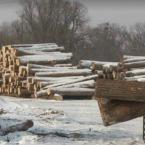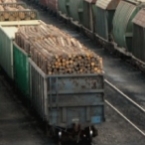 Timber theft goes on wherever forests stand. We like to think that it is a phenomenon that occurs only in the wilder, more remote backwoods of the world. But in fact, I've had several folks relate to me about illegal logging activity off their land right here in the United States.
Timber theft goes on wherever forests stand. We like to think that it is a phenomenon that occurs only in the wilder, more remote backwoods of the world. But in fact, I've had several folks relate to me about illegal logging activity off their land right here in the United States.
The video (posted below) by the University of British Columbia School of Journalism - Pirating Russia's Hardwoods - is an eye-opening report by the Wall Street Journal on timber theft in far east Russia. It gives one a sense of how serious this issue can be when you're down at boot level. I witnessed the same feeling several years ago as a forest marshall in Bulgaria described to me his frequent shoot-outs with timber pirates in that country.
|
Lumber Liquidators May Have Received Illegal Hardwood: Report |
The investigator in the video makes a good point...that once timber is sawn, it is nearly impossible to tell legal from illegal timber. Thus, the secrecy you see in the video at mills "operating on the edge." And there is another good point made...that permits to access stands specifically for small-diameter harvesting or thinning can be used to gain access to the more valuable fully-grown trees.
The story opens with a Russian landowner telling of his struggle to protect his linden trees from timber pirates. The linden trees referred to are of the genus Tilia; cousins of our own Tilia americana, or American basswood. The flowers of most Tilia species are productive havens for honeybees, and the nectar the bees collect from the trees is especially favored by bee-keepers for its light and subtly-rich flavor.
A hidden cost of timber theft; no trees, no bees.
One could question the opening line of the video that begins, "The last forests of the world...", when we know that much of the world's land mass is still heavily forested...in fact, growing at an astounding rate in many parts of the world. Hyperbole in unnecessary in telling this story. Last forest or not, the situation should be remedied, not only for the benefit of the legal owners of the timber, but for the improvement of legal timber market economics.







Have something to say? Share your thoughts with us in the comments below.